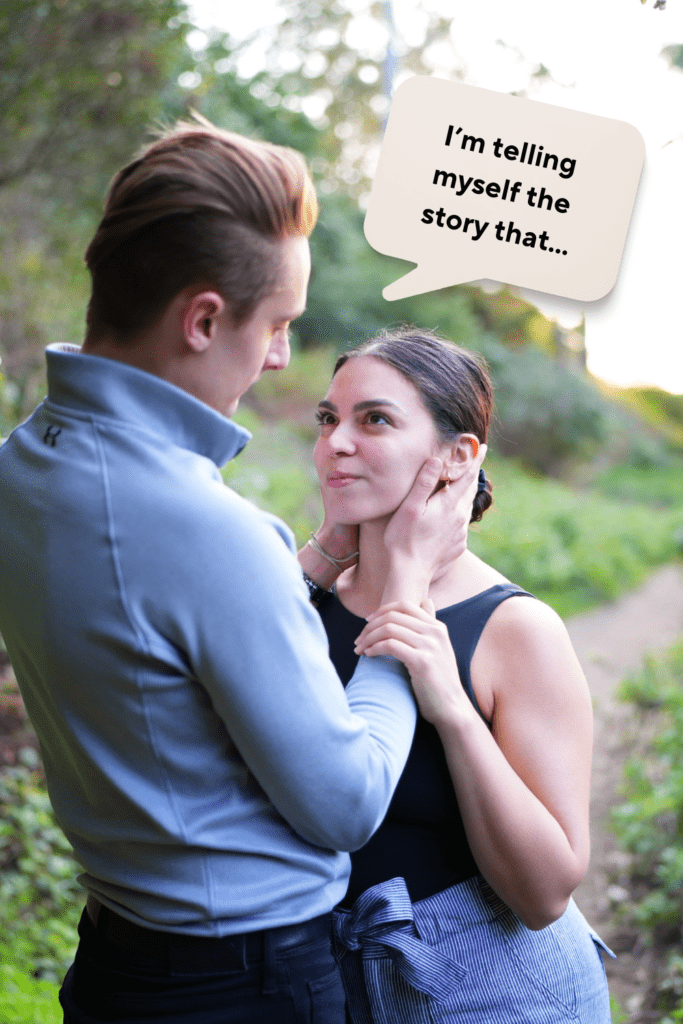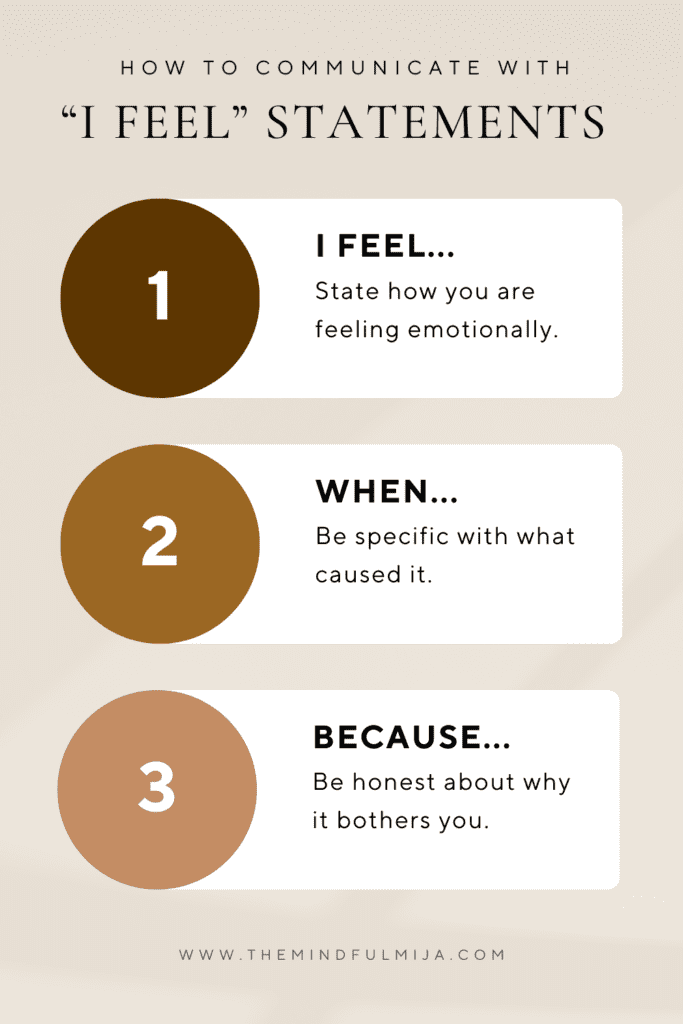If you’re like me (& uhhh, like everyone ever… 😅), you didn’t have perfect role models to show textbook communication strategies.
In fact, it’s likely that you picked up some straight up ineffective communication patterns. Not only that, but you probably also have some childhood insecurities (or even traumas) that get triggered even in present day.
When you’re in any relationship—whether it’s romantic, friendly, or even with your new boss at work—those small gaps can turn into massive, dangerous caverns.
In this blog post, you’ll learn 7 practical strategies & phrases that will level-up your communication, in partnerships & beyond.
I want to preface this by saying a few things…
- These tools will work much better with a partner who is willing to participate (& ideally reciprocate).
- These are all just suggestions that should be tailored to your own relationship!
- These do not apply to abusive relationships.
Let’s get into them!
1. Use “And” Instead of “But”
This one is one of my favorites because it’s so easy & it makes a lot of sense!
In most cases when you say “but,” you should actually be saying “and.” “But” entails too much contrast, meaning that the phrases don’t actually coincide. In reality, both parts of the phrase are typically true.
Let’s look at some examples…
- I want to take out the garbage BUT I am running behind.
- I really want to give you a foot rub BUT I’m way too tired right now.
- I know I said I’d do the dishes BUT I’m finishing up work.
* Shudders * I’ve gotten so used to avoiding that word that typing that was hard for me…
In all of these, it actually would’ve been more accurate to say “and,” because both things being said are actually true!
2. “I’m Telling Myself the Story That…”
This is a phrase that B’s therapist taught him & as someone who tends to catastrophize, it’s been a game-changer for me!
When you are starting to go down a rabbit hole of feeling like you’re not loved, they just don’t care, they’re going to leave, etc., be honest about those feelings & preface them with “I’m telling myself the story that…”
It is an opportunity to voice those catastrophic thoughts that are very present in your head, but feel too dramatic or unrealistic to share. If you have a history of childhood trauma or being gaslit, this would likely be very helpful & freeing for you.

I’m going to give you an example…
B is working on a project & I ask him a what he wants for dinner. He doesn’t respond. I automatically assume it’s because he doesn’t want to do household tasks, even though logically I know he is always helpful & proactive in that arena.
I tell him “hey hun, I’m telling myself the story that you don’t want to help with household tasks because you didn’t respond to my question.”
Now, he might say he is really busy & ask if I can just handle things for this evening, OR he might hop out of his chair & whip up the sides while I make rice. Regardless, he will likely always say that he wants to help & he was just really into whatever he was doing.
Every feeling you have is valid, but maybe not accurate. You don’t have to believe everything you think.
Through communicating your fears while also recognizing them as stories (rather than facts), you give your partner the opportunity to affirm your feelings & ease your worries.
3. Implement Do-Overs
I had never, ever heard of a do-over before dating B, but now they’re a regular part of our communication.
A prerequisite to this is having self-awareness to know when something makes you upset.
If one person does something that wasn’t the most empathetic or kind, you can make repair the situation by asking for a do-over & saying it in the way that would have been more loving.
B & I make it fun by literally making a rewind sound like in movies (& honestly, that silliness alone diffuses tense situations!).
This is something that happened the other day…
I was feeling overwhelmed, trying to get things done for work. B asked me a question & I snapped at him (yes, these things will always happen…you can’t totally escape being human!).
He was taken aback & I could tell by the look on his face that my tone had hurt him. I quickly apologized, then I asked for a do-over. His face lightened as he said, “of course.”
We did our little rewind dance, he repeated his exact question, & I responded in a tone that was much kinder (& in alignment with how I actually want to talk to my honeybear).
There might still be some lingering sadness because of what happened originally. But (ahem, and…haha) there are several reasons why this practice is so powerful:
- We learn through repetition. You’re practicing how to act in future situations, meaning that it’s more likely to play out in the way that you want.
- Emotional safety is fostered. Your partner shows they care about your feelings in the present, & this makes you feel safe to keep sharing in the future.
- It stops resentment in its tracks because you are able to see that your partner cares deeply enough to address things right away.
We are two imperfect humans living in an unpredictable world—what could possibly go wrong? 😅
We looove do-overs because they emphasize the importance of empathy & continual growth, rather than expecting your perfection from your partner.
4. Use “I Feel” Language (Both Emotionally & Physically)
Lately I have become particularly fond of feelings. I grew up as a massive people pleaser & learned to be attuned to everyone else’s feelings except my own, so in the last few years I have been re-learning how to honor my own emotions.
If you’re in the self-development world, you’ve probably heard about “I feel” statements. They tend to go something like “I feel…when…because…”.
If you’re not familiar with these (or just need a crash course), “I Feel” statements are a formulaic way of communicating to increase the chances of your feelings being heard & decrease the chances of tensions worsening.

Rather than saying “thanks for leaving me on read 🥲” you could say something like: “I feel anxious when you don’t respond to my messages because I’m scared that something bad happened to you.”
They’re great because they focus on what YOU are feeling & what YOUR needs are, rather than just pointing the finger at the other person (or being horribly passive!).
It also helps because they can’t diminish the importance of your emotions, since you’re giving an explicit reason for their validity.

Another thing that is important to talk about is your physical, bodily sensations.
There is a difference between sensations & emotions, but oftentimes we use the term “feeling” to be a blanket term for both.
While sensations are how your body is physically feeling (ie. chest tightness, light, tense, open, etc.), emotions are how you make sense of those sensations.
Sometimes you have a bodily sensation that you would tend to see in a negative light (for me, that tends to be chest pain, jaw tightness, & an empty feeling in my abdomen), but you might not know what it’s from.
In these moments, it’s helpful to let your partner know about what’s happening so that they are able to help you navigate them.
Two nights ago B made a comment that I can’t even remember anymore, but I got instant chest pain. He meant it as a joke, but it had triggered my nervous system & I didn’t know why.
I let him know about how my body was feeling, I asked for him to put his hand over my heart with me, we took some deep breaths then talked about what it might be. Once we figured it out I shook my body to let that energy move & exit.
In the beginning of that encounter, I didn’t necessarily have any particular emotion–I just felt bad. I wasn’t able to decipher what was going on. But my body knew that something didn’t sit right.
My fingers keep typing away & I’m realizing I’ve got a LOT more to say on this topic, but for now, just remember to share how you’re feeling—whether that be physically or emotionally!
5. State Things Objectively (Nonjudgemental Noticing)
When I would start to think the worst in situations, one of my therapists used to ask me, “what are the facts?”.

Stating things objectively is powerful because…
- You have the opportunity to be an objective, nonjudgemental mirror.
- It helps decrease defensiveness in your partner because these facts are undeniable.
- You are focusing on the well-being of your partner, rather than the stories you might be assuming.
For example:
I get home from a long day & go to give B a huuuge hug (we’re big huggers in our sweet fam), but he shrinks away & doesn’t reciprocate my affection. I have a couple of options.

I could tell myself he is mad at me & spend the rest of the night shying away.
OR I could state the objective: “Hey hun, I noticed your body is language is a bit distant. I went to hug you & you leaned backwards, & that’s not your baseline. Is everything okay?”
The first option (which I used to do often, tbh) would leave us both feeling bad the entire evening, until one of us finally decided to take initiative & lean in—& who knows when that might happen??
Stating the objective allows me to get curious about what’s going on without the other person feeling attacked.
It will help B feel seen & give him the opportunity to open up about whatever is on his mind. He will feel important, & I will know that it has nothing to do with me (or even if it does, we can clear things up).
This is especially helpful if you already have a mindfulness practice that increases your self-awareness & allows you to practice curiosity rather than judgement. But whether or not you do, it’s a great way to keep honing your skills!
6. Depersonalize Problems
Depersonalizing problems means that when your partner brings something up, you focus your attention on the problem rather than on your ego.
While you should always take ownership of where you might have contributed to issues, you can also recognize where the magnitude of the issue might be a byproduct of other stressors (whether that be long work weeks, childhood wounds, a sick kiddo, etc).
This increases your empathy while also helping your partner get to the root of deeper issues (& maybe even core beliefs that don’t serve them anymore).
The other night I was getting worked up about making sure the faucet stayed spotless after cleaning night.

I brought B into the bathroom & started performing a step-by-step tutorial on how to contort your body to carefully dry your hands without splashing water.
He looked at me, telling me that he would try to remember to replicate my (overly intricate 😅) process, but he had a question mark on his face…
“Why is it so important for it to stay clean?” he asked.
I went on about how it just looks nice, it’s saves time when we deep clean, etc etc.
Eventually I talked about how I grew up where one parent did all of the cleaning & I saw how much energy it took. When the other parent would make things messy, it seemed like they weren’t honoring the cleaner’s time or efforts.

Through B completing extra steps to keep the faucet clean, he would be telling me that he was appreciative of the energy I had invested into keeping our home tidy.
He could have gotten defensive, assuming I was calling him a slob (he is quite the opposite, actually!).
He could have gotten annoyed, saying I was being too controlling (which, I guess arguably…uhh…🥲).
But instead, he got curious.
While it is true that we both prefer things to be neat & tidy, it also—& probably even more so—had to do with childhood wounds that have caused me to fear feeling unappreciated or undervalued.
Remember that we are all human & we will all have less-than-optimal moments.
AND!
That doesn’t take away from the fact that we love each other deeply.
Use that to depersonalize problems & choose curiosity when these moments come up!
7. Set Clear (or Completely Release) Expectations
An expectation is something that you think is going to happen (based on prior experience, research, or simply what you desire). It’s a creates a clear vision of what is to come & when that vision is not met, we face mental hardship.
Our attachment to expectations keeps us from enjoying things for what they are, & that can happen a lot—in any relationship. There are two individuals with two sets of expectations that may or may not be communicated, let alone coincide!
Expectations that are not communicated (therefore not meet-able) are a ticket to resentment.
Have you ever done something that you loooved, but your partner looked absolutely miserable? It’s probably because that experience met (or exceeded) your expectations, but it didn’t do the same for theirs.
Earlier this year, B & I went on a road trip from San Francisco to Baja California.

What if I had had an expectation that we were going to drive straight through to spend all of our time in a Mexican villa, & he had an expectation that we would sight-see throughout?
I would spend the entire drive rushing him, & he would be getting frustrated that I wasn’t stopping at the gorgeous vistas.
Or what if I had an expectation that we would use the trip to take a lot of photos & videos for content, but he had no interest in being my Instagram Husband?
I would spend extra time curating outfits & perfecting my makeup, only to resent him when he didn’t magically offer to be my photographer.
Talking about what you each want from an experience will not only save you from resenting one another, it will set clear metrics for success & enable you to support one another in striving for it.
This isn’t just specific to a vacation…
- Parties: Matching outfits? How long do you want to stay? Do you want to be inseparable, or part ways to catch up with others? Designated driver? Do you want any couple or group photos?
- Holidays: Stay home, international vacation, or family’s house? Gifts? Decorations? How long will they be up? Maybe your family always did a Turkey Trot, theirs snuggled on the couch until dinner.
- Weekends: Homebodies or weekend getaway? Workout or rest days? Work on side project or chill, cook extravagant meals or go to dinner, hang with friends or solo time?
B & I also love making expectations to NOT have expectations. Umm…huh?? 🤔
Last month we went to a wellness gathering. I didn’t want to get overly excited then be disappointed, but I also didn’t want to have low standards & be tuned out before I even arrived.
We made the agreement to not have any expectations except to show up, be ourselves, & try to be present.
We had a BLAST & made so many friends! When the founder asked if the event had met my expectations I laughed & told her that actually, I intentionally had not had any.

It doesn’t matter what the expectation is (or is not!)—what matters is communicating with your partner so you can navigate them, together!
